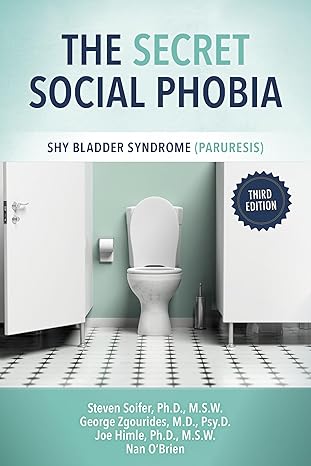How Does Graduated Exposure Work?
Recently, IPA Executive Director Tim Pyle sat down with IPA Co-Founder and Senior Advisor Dr. Steve Soifer to talk about Graduated Exposure.
Watch the 13-minute video here!
An excerpt from “The Secret Social Phobia”:
The authors believe that the best treatment for SBS is referred to as graduated exposure therapy. Graduated exposure therapy is widely used for overcoming many fears and phobias, including fears of heights, enclosures, small animals, flying, and driving. The theory behind it is that the more often a person confronts a situation that is frightening, the less frightening the situation becomes. This treatment is based on a simple concept: do what you fear. However, in order to gain the most benefit from doing what you fear, the object or situation you fear must be confronted gradually, often, and for prolonged periods of time.
For people with paruresis, since the avoidance of urinating in public rest rooms is a large part of the phobia, the “do what you fear” concept of graduated exposure therapy involves gradually and repetitively attempting to urinate in the presence of others, in situations ranging from those which are “safe” to more challenging situations. Exposure sessions should last approximately one hour and should be conducted as often as possible. Multiple sessions each week are preferable, but at least one session weekly is a must.
If you are male, conduct all of your urinating exercises while standing up, aiming directly at the water in order to maximize the sound, without excessive background noise. The reason for this is that buffering urinary noises only makes therapy longer and harder because you are trying to hide/disguise your problem rather than facing it fully. But remember, even the above suggestions might have to be done gradually; for example, beginning to make a little noise with your urine first and then increasing the sound it makes.
In order for graduated exposure therapy to be the most helpful, it is important to try to urinate as many times as possible during each practice session. Consequently, a substantial amount of urine is needed. You know what that means! You will need to drink a lot of fluids, to the point that you feel you are going to burst. This process is called “fluid loading.”
The idea of fluid loading goes against one of the main coping mechanisms people with paruresis use, that is, controlling the intake of fluids in order to control the “when and where” of needing to urinate. However, for treatment purposes, the increased urgency will facilitate your ability to urinate, and thus your success in doing so. Fluid loading is a critical step in graduated exposure therapy for SBS and cannot be skipped or minimized.
Keep in mind that everyone differs in the amount of fluid needed to feel urinary urgency. Some people need to drink a lot of fluids; some may not need to drink much at all. The type of fluids you choose to drink is up to you, but many people with paruresis find that water, tea, and coffee work best. Two cautionary notes. One, unless you know the effects of caffeinated beverages on your paruresis, avoid them, at least initially. Two, do not overload on fluids. You are striving to have about a seven out of ten level of urgency, which is the level at which the bladder mechanism works optimally.
To read more, click here to purchase your copy of Dr. Steven Soifer et al.’s “The Secret Social Phobia: Shy Bladder Syndrome (Paruresis)” published by the IPA.
QUICK LINKS
INTERNATIONAL PARURESIS ASSOCIATION
P.O. Box 21237
Catonsville, MD 21228
You Are Not Alone.
There Is Help For You!
Shy Bladder, Bashful Bladder, Pee Shy
IPA OFFICE HOURS
Monday - Friday
10:00am - 6:00pm (ET)
844-I-CANT-PEE (422-6873)
US/Canada
443-315-5250 Office
Email: getinfo@paruresis.org
This website is NOT a substitute for medical or legal advice and does not constitute the practice of law, medicine, psychiatry, clinical psychology, clinical social work, or any other mental health profession. If you are having trouble urinating, you should always contact a physician since difficulty with voiding can be a symptom of a serious medical condition. We are a group of professional people and people who have suffered with paruresis. We have assembled a board and a board of advisors to help people cope with urinary dysfunction that has a psychological or social origin. On this website, we are NOT practicing medicine, psychiatry, clinical psychology, clinical social work or any other mental health profession. You should have your doctor evaluate your condition before diagnosing yourself, and seek the appropriate necessary mental health counseling if warranted. IPA, Inc. disclaims any and all legal liability whatsoever. Use of the term “member” or “membership” refers to donors above $100 each July 1 to June 30 period and does not convey any legal or ownership rights in IPA.




